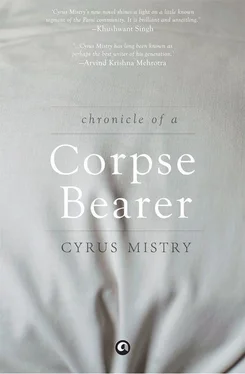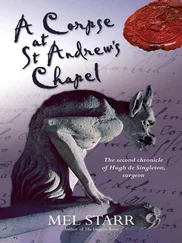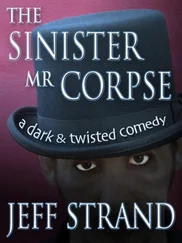‘Oh, she had a wonderful sense of humour, a great fighting spirit. .’
Wiping her eyes which had begun to glisten with the precipitate of anguished memories, she continued:
‘When I was really little, she would spoil me completely with her coddling. .she couldn’t bear to see the slightest shadow of glumness or dispiritedness in my face. Immediately, if she thought she had sighted it, she’d do her best to cheer me up— by clowning, or saying something silly, or even performing a comical little jig just for my amusement. She would have me in splits of laughter in no time, till the tears started rolling down my cheeks. . Only after she was dead, I often wondered if her desperation to keep me distracted and “happy” at all costs didn’t have something to do with a deep suffering of her own — or the memory of a suffering — something which she had never let any of us catch a glimpse of. .’
Poor Seppy, she suffered, too. Until the end, there were days when she seemed completely overwhelmed by gloom. She told me she had never been able to quite rid herself of that feeling of guilt that kept coming back to haunt her — that she had been, in some way, responsible for her mother’s suffering and extinction. How strange then, that our own daughter Farida should have lost her mother when she was almost exactly the same age as Seppy had been when Rudabeh met her unhappy end: three years old.

Now older, Farida didn’t like being carried about in mine, or anyone else’s, arms. For me, there was nothing more pleasurable than to lift her lightweight, elfin body, and squeeze it tenderly against mine, as we strolled through the bamboo grove, or pear orchard, in the fading evening light.
This was the only free time I found to spend with her, after my work was done, and she had put away her schoolbooks. I liked to take her out, away from Temoorus’s obstinate fussing. But already, she had discovered she didn’t like being carried as much as she enjoyed walking beside me like a grown-up, conversing with me with the thoughtful circumspection of an adult. On one evening, that I can recall clearly, she seemed to be in low spirits. Her moodiness reminded me of her mother, Sepideh. For a while, she didn’t object to my carrying her; but, within minutes, she said rather firmly:
‘Put me down, Daddy.’
After only a short distance of walking hand in hand, her tiny palm smothered in my coarse and calloused one, a faint tremor informed her voice as she whispered the question that was, I realized, at the brooding swirl of her sadness:
‘Daddy, why did the snake bite my mummy?’
‘Well. .’ I thought for a long time before answering. ‘Snakes don’t know right from wrong. . Your mother must have stepped too close to that cobra, he must have been scared she would harm him. .’
‘Mummy would never harm anyone. .she loved animals.’
‘He didn’t know that. . He was scared. . And she didn’t see him, until he bit her. . Your mother loved all creatures. She would feed the squirrels with her own hand, and they were not scared to come up close and nibble. .stray dogs, peacocks as well. . That snake didn’t know all this, you see. .’
‘But then. .why. .?’ She let her question trail off.
Farida was perhaps not able to state in words what she wanted me to clarify, but I sensed her meaning. Even had she found the words, I’m not sure I would have had the answer. It was a question that has troubled me for several years.
Throughout childhood and youth, I cultivated, as well as earned the reputation of being a good-natured simpleton. But despite willingly abiding in this rather low-brow realm, I remember harbouring always a secret yearning — even a quiet confidence, you might say — that there was, that there had to be, some overarching meaning to the universe.
I’m sure I’m not alone in feeling this, and don’t deserve any special credit for it. It’s probably something about the way our brains are wired that makes us humans crave this grand design — some of us, like my father, even believed they had grasped, and harnessed it — that there is some divine formula or secret equation, that connects every phenomenon of existence, every shimmering facet of life and death. Father believed this divine secret wasn’t accessible to everyone, that it required deep and great faith to comprehend. But I’ve noticed, elaborate systems of belief have been concocted and espoused over the centuries by man merely to buttress this sad need for meaning; indeed to make life’s transience bearable.
Perhaps the question Farida had been unable to verbalize was just this: if her mother loved animals so much, and cared for them, then why, in our little garden of paradise, did the reptile have to infect our happiness so conclusively, so irreversibly? Was there simply no justice or propriety in this universe?
It was much darker now, as we approached the denser, gloomier forest at the top of the hill.
We had already left behind the three Towers, and now circumvented the fourth, defunct one, overgrown with weed and thicket, much of whose masonry had crumbled. . Just a few yards away was Seppy’s favourite hangout, the giant banyan, its aerial roots so overgrown and entangled, it was impossible to see any detail of it in the dark: it looked just a huge woolly, prickly mass.
I would have preferred to turn back, but Farida wouldn’t hear of it.
‘Just a little further, Daddy, please. .’
‘No one ever comes here, dear, really we’d better be getting home now. .’ Stubbornly, she kept walking, looking at her feet, as if she hadn’t heard me.
‘If you want to go any further, young lady, I’ll simply have to carry you.’
To my surprise, she readily agreed — the abundance of ferns and thistle would have begun to scratch and tickle her ankles— hugging me warmly, as I raised her to my arms.
The sounds of the twilit forest pressed about us, eerily. The trees towered over us, encircled with thick, winding creepers that looked in the dark like monstrous serpents skulking for prey. Through the canopies of the trees, occasionally, one could still see glimpses of the cloud-banked evening sky. The ground I was walking on was a carpet of decaying leaves, dead branches and occasional, rotting fruit. There were mango trees here and banana, berries, pepper and wild pineapple. . Soon it would be completely dark. I began to smell the prospect of a drizzle. But my little one, like her mother before her, wanted to press on, probing unrelentingly into her own unbearable, incomprehensible loss.
‘Was it here that she got bitten?’
‘Somewhere in these thick woods, I imagine. . Don’t know exactly. I wasn’t home when it happened, if you remember. . you may not, of course, you were so—’
‘I do remember, Daddy, I do. Her leg was swollen, she was in great pain. When they carried her in, I started crying. .’
Myself, I was pretty familiar with these unfrequented parts of the estate: secret places that glowed in the late evening and night with a natural phosphorescence engendered by the forest itself and its unique mix of vegetation and decay. Nobody ever visited these areas, in the course of things. In any case, they were out of bounds for all except the corpse bearers who had no reason to wander so far beyond the Towers. But I had walked here several times, late at night, aching for some contact with my lost partner. Beside myself with grief, I would talk to her aloud in these woods, weep, rage. . Had she merged with the forest, the banyan tree, those hills in the distance or those dark clouds? I would plead with her for some intimation, some sign. . but there was nothing; never.
It was here, in fact, born out of sheer frustration, that the realization came to me for the first time, dark and comfortless: how inhuman and cold Nature could be, how alien to man. I hugged Farida tightly and said to her, rather firmly, ‘We have to go back now. .’
Читать дальше













